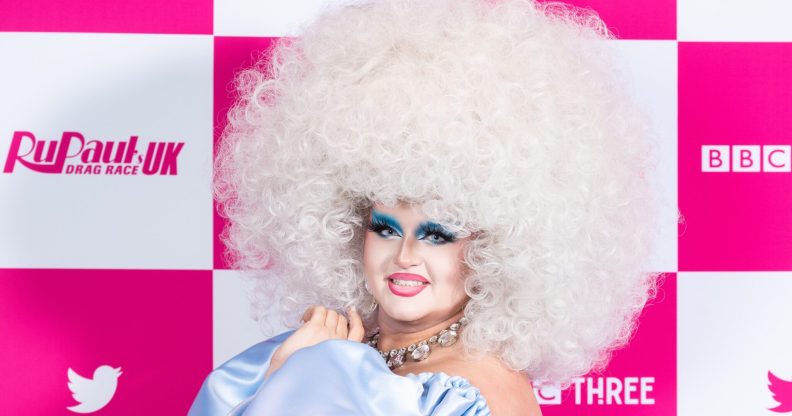Drag Race UK’s Victoria Scone sparks passionate debate on drag’s attitude towards women

(Photo by Jeff Spicer/Getty Images)
RuPaul’s Drag Race UK star Victoria Scone called out drag performers who use breasts as a punchline, sparking a debate about misogyny and drag’s attitudes towards women.
The Cardiff queen, who made history as the first cisgender woman to compete in the RuPaul’s Drag Race franchise, continued her history of challenging the status quo in drag with a series of tweets on Sunday (20 March).
Victoria Scone called out “the obsession with breasts” among some drag performers, tweeting: “I understand that sometimes the obsession with breasts and drag can be a love letter to women but it’s really nooooooot feeling like that.”
Many came forward to agree with Victoria, noting the potential for certain types of drag to make women feel out of place. One follower went so far as to say that it “makes [them] feel gross in [their] own body”.
I understand that sometimes the obsession with breasts and drag can be a love letter to women but it’s really nooooooot feeling like that.
— Victoria Scone BLACK TRANS LIVES STILL MATTER (@VictoriaScone) March 20, 2022
Victoria elaborated in a longer thread, writing: “I appreciate breast plates are used artistically. I just don’t think they have to *always* be the punch line of every joke or the basis of a WHOLE act. We have the right to dislike something. Just like how some people dislike a certain colour.
“When they are used in a certain way, as a breast owner, it can make me feel uncomfortable. There’s not really an argument to have there. It just does. And might do to others.”
She added: “I love good old fashioned tongue in cheek humour. Panto humour. Clever, thought out, intellectual, sock in a bra humour. Whatever the f**k that is. But I think we all know jumping around in a breast plate isn’t remotely thoughtful or artistic or even funny.”
To elaborate (because I want to): I appreciate breast plates are used artistically. I just don’t think they have to *always* be the punch line of every joke or the basis of a WHOLE act. We have the right to dislike something. Just like how some people dislike a certain colour.— Victoria Scone BLACK TRANS LIVES STILL MATTER (@VictoriaScone) March 20, 2022
Some fans disagreed with Victoria Scone’s take, including those who argued that wearing breast plates is part of the tradition of drag playing with gender expression. Others said gay men ought to listen to such critiques coming from queer women.
Among those who agreed with Victoria was Drag Race UK’s Tia Kofi, who tweeted: “There’s a lot of queens (and audiences) who seem to think that jiggling a breast plate is hilarious. We could also like, I dunno, actually do comedy instead of using misogyny as a placeholder for humour. Do better.”
There’s a lot of queens (an audiences) who seem to think that jiggling a breast plate is hilarious. We could also like, I dunno, actually do comedy instead of using misogyny as a placeholder for humour. Do better. https://t.co/mK8BSoHWWP— Tia Kofi (@TiaKofi) March 20, 2022
Being a queer woman in drag
Though Victoria Scone is part of a small group of women to have competed on RuPaul’s Drag Race, there are countless women out on the drag scene performing as kings, queens and everything in between.
Heather Paterson performs as Anna Kissed, and told PinkNews that her experiences as a queer woman in drag have varied drastically.
Though many smaller arts venues have given her a “much friendlier welcome”, she has found that some high-profile LGBT+ venues have failed to provide environments with the same level of acceptance.
“I think there’s a lot of the traditional… what we would call LGBT+ venues that are actually white gay men’s venues,” she told PinkNews. “If you are female, or a person of colour, or disabled, or anything other than that very narrow demographic, then it’s not made to feel like a space for you.”
Heather says that “mainstream drag” can exclude queer women specifically. “Often it is actively promoted to gay men and their straight female friends,” she said, noting the rise of straight women on hen nights at drag shows, “so it’s not necessarily about excluding women but about how mainstream drag can exclude queer women specifically”.
“I don’t think, in a month of Sundays, I would want to be in Victoria’s position,” she added.
Drag SOS’ TeTe Bang has previously spoken to PinkNews about the issue of tokenism that impacts women in drag.
“Can you imagine how it must have felt for Victoria Scone going in completely alone into [Drag Race UK], knowing that there was nobody there that had the same experience as she did, nobody saw the world the way that she saw the world,” she said at the time. “When you put somebody who is a minority in a situation with 10 predominantly cis men that’s still tokenism, it’s not equality.”

